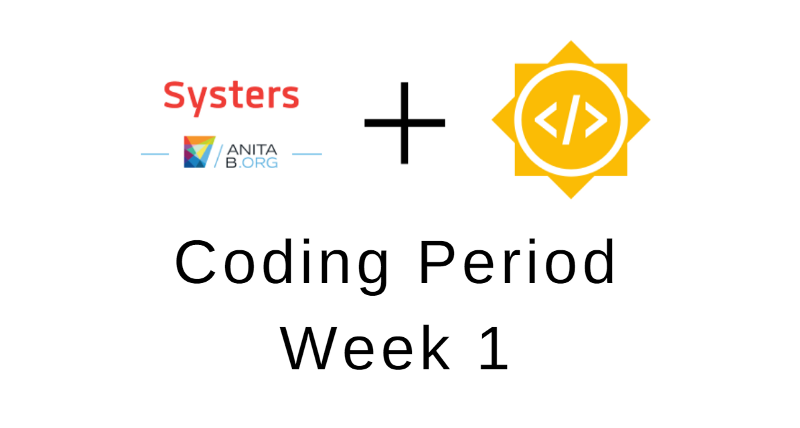Google Summer of Code | Week 1

This week — May 14 to May 20 — was the first week of the coding period of Google Summer of Code (GSoC) with Systers Open Source. If you want to know more about this you can read the introduction to my journey here.
Introduction
The Coding Period is where the students are dedicated to coding their projects. This period has 3 phases separated by evaluations. I and the mentors agreed, during a project weekly meeting on the Community Bonding phase, on the action items for the first 4 weeks, which represent the 1º phase of the Coding Period. These action items were then base for my mentors to create the issues so that I could start developing.
My work items
After defining the main action items for the 1º phase of the coding period, we distributed them among the 4 weeks. This week I had two action items, for the backend development:
- API to register a new User in the system;
- API to send verification email for new Users.
Roadblocks I had during this week
First I have to explain some roadblocks I faced this week. Aside from the GSoC program, I’m finishing my Master’s thesis this month. Because of this I still had thesis meetings with my supervisors and I had to start preparing for my Dissertation presentation. This took me some time of the week. Besides this, I’m not used to developing backend, although this is something I wanted to explore. Since the 1º phase of the coding period requires that I develop a version of the backend with flask, I had to study this. I started studying in the Community Bonding period but it wasn’t enough, I still had to experiment in sample projects and watch more video tutorials (provided by one of my mentors), which I did this week. This lack of experience with backend slowed down my initial development. On top of this, I had a problem with my PC, which led me to format the PC, taking me a big portion of an entire day.
What I did this week
Having the roadblocks out of the way, I still managed to do some part of my working items. After learning a bit about how to develop using Flask-RESTPlus, I started developing the base architecture of the backend, by implementing the 1º action item — REST API to register users into the mentorship system. I also coded Users CRUD operations (e.g.: list, update and delete users). I did this already using SQLAlchemy, with the flask-SQLAlchemy extension, which eased a lot of the development. Besides this, I also managed to implement a part of authentication features, with JSON Web Tokens (JWT). I did this by using another extension of flask, flask-JWT.
Development and technologies I used
I’m developing with Python 3.x and flask on my fork of the systers/mentorship-backend repository. You can see the latest version of the code in the gsoc18-code of the main repository.
These are the main extensions of flask that I used during this week:
- Flask-RESTPlus — an extension for flask that facilitates REST APIs development. This also helped exposing Swagger documentation.
- Flask-JWT — an extension for flask to add basic JWT features to a flask. This was used specifically for User authentication with a username and a password, then returning an access-token to login into the System.
- Flask-SQLAlchemy — an extension for flask that adds support for SQLAlchemy. This allowed me to add persistence to the application, in an easy and flexible way.
Setting up the development environment
I’m developing on Ubuntu OS. These are the other tools I’m using for the development:
- Virtualenv — This allows the creation of isolated Python environments;
- Postman — API Development Environment that allows me to test the REST API;
- PyCharm — Python Integrated Development Environment (IDE) by JetBrains;
- Atom — Open source text editor by Github.
Final observations
I’m a bit late on the actual schedule since I didn’t implement the API to send an email verification yet, and I still have to finish the tests for my code. Nevertheless, I already started implementing some working items from the next weeks, such as Login and Edit profile API. Despite this, I working towards compensating the lost hours with my roadblocks and managing my time wisely.
This week has been a little stressful because of all the roadblocks, I’m very glad that I had my mentors support and understanding. This support really helps me keep calm.